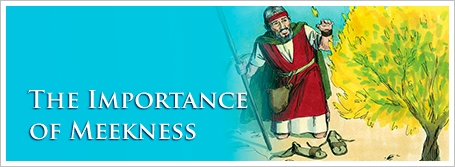Have you ever received instruction and thought, “I already knew this. Why are they telling me this? Do they think I don’t know?” Or, maybe you have received some constructive criticism and thought, “Well, I don’t know why they are telling me this when they don’t even understand the situation.”
It is not uncommon to have thoughts like these or similar; it is human nature. However, when we are tempted to think like this, we can remember that we, as believers, have the spiritual nature of Christ in us, which is superior to human nature. We can choose to redirect our thinking, renewing our minds to receive instruction from the Word with meekness.
What is meekness?
Meekness is a quality of being tender, receptive, and free from haughty (arrogant) self-sufficiency. A meek person is not preoccupied with self or with private interests. A meek person is willing to receive instruction from God, the written Word, and from all who speak it—and then change for the better.
Meekness is a quality that God encourages us to have in our lives.
James 1:21:
Wherefore lay apart all filthiness and superfluity of naughtiness, and receive with meekness the engrafted word, which is able to save your souls.
God exhorts us to be meek so that when He gives us instruction, we will listen to it, receive it, and act upon it accordingly.
The world sometimes paints a negative view on what it means to be meek. Some say that meekness is a sign of weakness or that being meek means you are a pushover. But that’s not what God’s Word says. As we saw in James 1:21, meekness allows us to receive the Word, which is able to save our souls. It makes our souls whole, sound—and that makes us stronger. When we decide to act upon instruction from God, we can absolutely change for the better.
To help us learn to be meek, the Bible gives us insight into people who were meek. Moses is an excellent example of being meek.
During Moses’ time, God considered him to be the meekest man on the earth. What a title! Moses was tasked with leading the children of Israel out of bondage toward the Promised Land. Moses had to be meek to listen to God and to successfully lead God’s people.
Numbers 12:3:
(Now the man Moses was very meek, above all the men which were upon the face of the earth.)
Moses came from a wealthy background and could have lived an affluent lifestyle, being known as the son of the daughter of Pharaoh. But by his decision to listen to God, Moses’ life changed for the better because he obeyed and was able to bring deliverance to God’s people.
Moses also showed great meekness to receive instruction from God when God showed him the burning bush and challenged him with a decision to learn more or to disregard it.
Exodus 3:3,4:
And Moses said, I will now turn aside, and see this great sight, why the bush is not burnt.
And when the Lord saw that he turned aside to see, God called unto him out of the midst of the bush, and said, Moses, Moses. And he [Moses] said, Here am I.
Moses had to be meek to make the decision to turn and see the bush and acknowledge it. His response of “here am I” is a sign of meekness to listen to what God wanted to say and then act on it.
Just like Moses, the great prophet and lawgiver, we too can turn to God and choose to receive His instruction with meekness and act on it. We can practice receiving instruction with meekness in all aspects of our lives. Then, when it is time to listen, receive, and act on instruction from God, we will be ready to say, “Here am I!”

